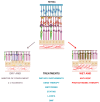Different Therapeutic Approaches for Dry and Wet AMD
- PMID: 39684764
- PMCID: PMC11641571
- DOI: 10.3390/ijms252313053
Different Therapeutic Approaches for Dry and Wet AMD
Abstract
Age-related macular degeneration (AMD) is the most common cause of irreversible loss of central vision in elderly subjects, affecting men and women equally. It is a degenerative pathology that causes progressive damage to the macula, the central and most vital part of the retina. There are two forms of AMD depending on how the macula is damaged, dry AMD and wet or neovascular AMD. Dry AMD is the most common form; waste materials accumulate under the retina as old cells die, not being replaced. Wet AMD is less common, but can lead to vision loss much more quickly. Wet AMD is characterized by new abnormal blood vessels developing under the macula, where they do not normally grow. This frequently occurs in patients who already have dry AMD, as new blood vessels are developed to try to solve the problem. It is not known what causes AMD to develop; however, certain risk factors (i.e., age, smoking, genetic factors) can increase the risk of developing AMD. There are currently no treatments for dry AMD. There is evidence that not smoking, exercising regularly, eating nutritious food, and taking certain supplements can reduce the risk of acquiring AMD or slow its development. The main treatment for wet AMD is inhibitors of VEGF (vascular endothelial growth factor), a protein that stimulates the growth of new blood vessels. VEGF inhibitors can stop the growth of new blood vessels, preventing further damage to the macula and vision loss. In most patients, VEGF inhibitors can improve vision if macular degeneration is diagnosed early and treated accordingly. However, VEGF inhibitors cannot repair damage that has already occurred. Current AMD research is trying to find treatments for dry AMD and other options for wet AMD. This review provides a summary of the current evidence regarding the different treatments aimed at both forms of AMD with particular and greater attention to the dry form.
Keywords: anti-VEGF; dietary supplements; dry AMD; neurodegenerative disease; wet AMD.
Conflict of interest statement
The authors declare no conflict of interest.
Figures

References
Publication types
MeSH terms
Substances
Grants and funding
LinkOut - more resources
Full Text Sources

